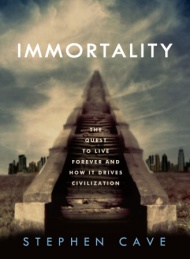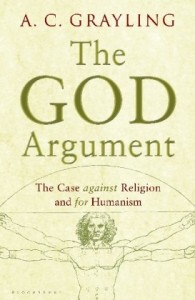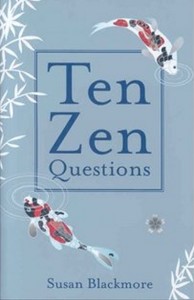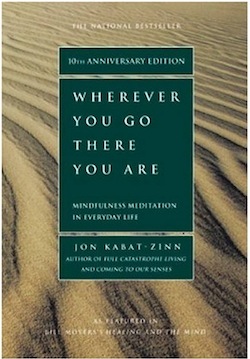 The Quest to Live Forever and How It Drives Civilization, by Stephen Cave (Amazon)
The Quest to Live Forever and How It Drives Civilization, by Stephen Cave (Amazon)
“The Mortality Paradox – On the one hand, our powerful intellects come inexorably to the conclusion that we, like all other living things around us, must one day die. Yet on the other, the one thing that these minds cannot imagine is that very state of nonexistence; it is literally inconceivable. Death therefore presents itself as both inevitable and impossible.”
“The Terror Management Theory – We must live in the knowledge that the worst thing that can possibly happen to us one day surely will. […] We have created institutions, philosophies and religions to protect us from this terror by denying or at least distracting us from the finality of death.”
“Immortality is not for the weak and foolish.”
“”Longevity Escape velocity” – living long enough to live forever”
“”Computational Resurrection” – the rerunning of software that is your mind on a new piece of hardware so that you might live again.”
“The Soul – the most influential single idea in the history of Western civilization”
“Whether or not we literally believe we have a soul that will go to heaven, the cosmic significance we ascribe to ourselves as unique individuals reassures us that we transcend mere biology. […] We are creating a myth of immunity to extinction.”
“Buddhists do believe in some essential part of you that survives the body in order to be reincarnated in accordance with the laws of karma. This is pure consciousness, stripped of all memories and convictions and the rest of the accumulated baggage of a lifetime. The Dali Lama describes it as a “continuum of awareness.””
“In Hinduism and Buddhism there is an undercurrent of recognition that the individual mind cannot continue without the body. Beyond the theory of reincarnation, which requires a soul robust enough to be punished for its past sins, there are hints of something more radical. Nirvana, for example, literally means “extinguishing” or “blowing out.” But what is it that is being “blown out” like a candle? Some Buddhists say worldly desires. Others, however, go further and believe it is the self that is extinguished. For some in the ascetic tradition, the source of worldly suffering is not just being in the world–it is being at all. Liberation therefore means to cease to be an individual altogether, or as the Hindus put it, to become one with the all, the Brahman.”
“We have already concluded you have no soul — no unchanging essence or immutable inner core. We could go further and say that there is, in fact, nothing that is the “real you.” You are just a collection of disparate thoughts, memories, sense impressions and the like, all bundled up together in a package we conveniently label a person. What is more, all these disparate parts are continually changing,as some things are forgotten and others learned, opinions changed and new memories formed. The question is, then, if you are such an ever-changing bundle, what does it mean for “you” to survive?”
“Psychologist Roy Baumeister has estimated the length of time for which most of us can expect to be remembered as seventy years. He points out that not many people can even *name* their great-grandparents.”
“People in modern cities long ago lost the ability to survive independently—we are utterly reliant on a complex higher level system for clean water, food, clothing, shelter, medicine, security and energy. Like the specialized cells of our bodies, which have given up their independence for the greater strength and security offered by life as part of a macro-organism, we have each given up our independence to be part of strong and secure superorganisms.”
“Individual humans are merely temporary forms taken by the single, shifting web of life on earth. If humans are not really separate things, then their births and deaths are also not real, but simply one way of seeing the rhythms of life.”
“The great social-reform movements of the last centuries — emancipation of slaves, equality between sexes and races, social welfare and son on — arose only when the preoccupation with the next world began to lose its grip on Western society. […] If this life here on earth is regarded merely as a series of tests for a place in another life, then it is necessarily devalued.”
“There are as I see it two sets of problems: on the one hand, the boredom and apathy that would result from having done and seen everything there is to do— that is, from having already lived a very long time—and on the other hand, the paralysis that would result from having an infinite future in which to do any further things. Both these problems, the backward looking and the forward-looking, threaten to suck the meaning out of life and leave one wishing for a terminal deadline.”
“Death is the source of all our deadlines.”
“Life as we know it may be too short to watch daytime TV, but eternity wouldn’t be.[…] Given infinity, time would lose its worth. And once time is worthless, it becomes impossible to make rational decisions about how to spend it. […] If civilization exists to aid our preparation into the future, then if that perpetuation were guaranteed, civilization would be redundant. […] Civilization exists to give us immortality, but if it ever succeeded it would fall apart.”
“We do not “see” or experience death; death is the end of all experience. […] Neither you nor I can ever literally *be* dead. Living things cannot be dead things. To talk of someone “being dead” is just a shorthand for saying they have ceased to exist. […] We can never be aware of (life) having an end — we can never know anything but life.”
“If you are happy now, then you are happy always, as there is only now.”



